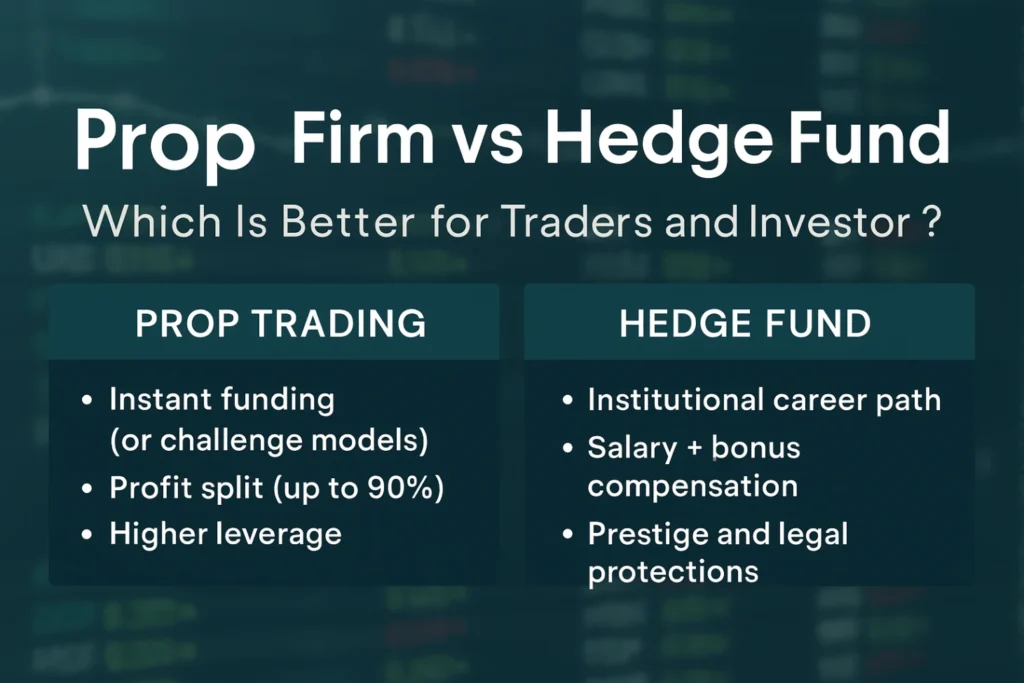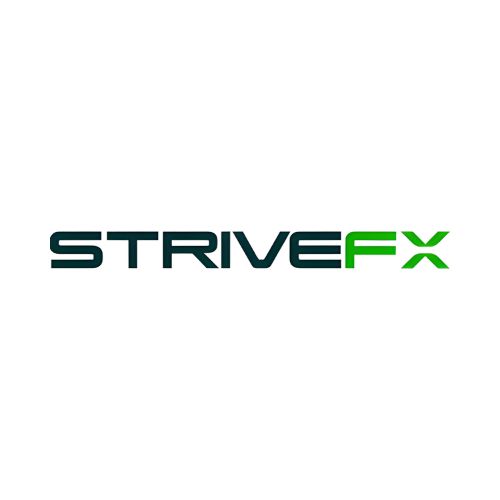Prop Firm vs Hedge Fund: Is Working for Prop Firm Better?
If you’re trying to decide between a prop trading firm or a hedge fund, here’s the brutal truth: prop firms get you in the door faster, but hedge funds offer fatter paychecks—if you can survive the process. Read on for an unfiltered, practical guide—funding, pay, risk, and career realities for traders.

What Is a Prop Trading Firm?
A prop trading firm (proprietary trading firm) funds you with company capital, not your own cash, and pays you a cut of profits.
Example: FTMO, FundYourFX, Audacity.
Key points:
- No clients—traders only risk the firm’s money.
- Profit splits range from 70%–90% for the trader (Maven, Alpha Capital, FXIFY).
- Instant funding models (no challenge): FundYourFX, Audacity.
- Lower barriers: Most accept global applicants, online-only.
Pro tip: You can open a funded account in days—no Wall Street CV needed.
What Is a Hedge Fund?
A hedge fund pools outside investor cash to chase returns using every trick in the book—long, short, derivatives, leverage, you name it.
Example: Citadel, Bridgewater, Two Sigma.
Key points:
- Only accepts “qualified” (wealthy) investors.
- Institutional structure: PMs, analysts, risk officers, quants.
- Heavy regulation (SEC, CFTC), complex strategies.
- Pays salary + bonus—base salaries for hedge fund analysts in the U.S. typically range from $100,000 to $150,000, with bonuses often matching or exceeding base pay (Wall Street Oasis, 2024).
How Do Prop Firms and Hedge Funds Fund Traders?
Prop firms: Give you the firm’s money to trade—no outside investors. You take a percentage of your own performance.
Hedge funds: Invest other people’s money (institutions, millionaires). You get paid a salary/bonus and manage investor risk.
Three differences:
- Ownership: Prop = firm’s capital; Hedge = client capital.
- Comp: Prop = profit split; Hedge = salary/bonus, maybe equity.
- Risk: Prop = firm eats losses; Hedge = you risk job if performance tanks.
Which Is Safer for Traders—Prop Firm or Hedge Fund?
Working at a hedge fund is more stable long-term, but prop firms let you fail faster with less personal fallout.
- Prop firm: Blow up? You get kicked off the desk—end of story. No lawsuits, no angry clients.
- Hedge fund: Underperform? You’re out. Blow up big? You’ll be remembered (and blacklisted).
Stat: Many traders who pass the FTMO Evaluation Process struggle to maintain profitability in the long term, often losing their funded accounts shortly after obtaining them.
Stat: The annual churn rate for portfolio managers at major multistrategy hedge funds is approximately 20%, driven by performance-based firings and poaching from rivals. (Business Insider, 2024).
Prop Firm vs Hedge Fund: Pay, Risk, and Career Path
- Pay: Hedge funds pay higher base salaries, but top prop traders can out-earn average hedge fund staff in good years.
- Risk: At a prop firm, the risk is firm-side. At hedge funds, you’re risking your reputation every day.
- Career path: Prop firm to hedge fund is common—hedge funds want battle-tested, risk-disciplined traders.
Example: Several ex-FTMO traders joined Millennium or Citadel after building a public track record.
5 Key Advantages of Prop Firms
1. Fast access to funding: No Ivy League needed—just pass an online assessment or, in some cases, skip it.
2. High profit split: Some prop firms pay up to 90% of net profits.
3. Flexible location: Remote trading—no commute, no office politics.
4. Lower entry cost: Fees range from $100–$500 (one-time, usually refundable if you pass).
5. Try/fail quickly: No three-round interviews—just trade.
Examples:
- FundYourFX, Audacity (no challenge, instant funded accounts).
- FTMO (largest by trader count, fast payout history).
5 Key Advantages of Hedge Funds
1. Higher absolute pay ceiling: Base + bonus + possible equity.
2. Career stability: Health insurance, legal protections, “real job” security.
3. Institutional-grade tools: Bloomberg terminals, custom algorithms, flow data.
4. Diverse strategies: Market-neutral, quant, global macro, arbitrage.
5. Resume boost: Big funds like Citadel or Bridgewater open doors for decades.
Examples:
- Citadel: Famous for tech, quant, and multi-strategy desks.
- Two Sigma: Pure quant, high salary, tight hiring bar.
Direct Comparison Table: Prop Firm vs Hedge Fund
| Feature | Prop Firm | Hedge Fund |
|---|---|---|
| Capital Source | Firm’s own money | Outside investors’ funds |
| Pay Structure | Profit split (up to 90% for trader) | Salary + performance bonus |
| Entry Requirements | Pass test/assessment, low barriers | Elite CV, multiple interviews |
| Job Security | Low—easy in, easy out | Higher—multi-year contracts |
| Tech/Resources | Varies, mostly remote tools | Institutional-grade everything |
| Max Leverage | High, depends on firm | Strict, based on risk mandates |
| Reputation | Niche, less prestige | Global prestige, resume clout |
| Location | Remote (usually) | Office/Hybrid (NYC, London, HK) |
| Regulation | Minimal, varies by country | Heavy, especially in US/EU |
Should You Start with a Prop Firm Before a Hedge Fund?
If you want to skip finance school and trade real money fast, start at a prop firm. If you want a finance career, aim for hedge funds—but expect brutal competition.
Pro tip: Prop firm experience counts. Funds hire prop traders for their risk discipline and live P&L, not for university essays.
Common Myths about Prop Trading and Hedge Funds
Myth 1: “Prop firms are just scams.”
Fact: There are scams—there are also top-tier, fully audited firms with multi-year payouts. Research before sending cash.
Myth 2: “You need a math PhD for hedge funds.”
Fact: Quants, yes. But macro, event-driven, and some equities traders don’t have STEM degrees.
Myth 3: “Hedge funds never lose.”
Fact: In 2022, Tiger Global Management, a prominent hedge fund, experienced significant losses, with its hedge fund and long-only fund declining by 52% and 62% respectively since the beginning of the year. These losses were among the largest ever recorded in the hedge fund industry. (Source)
FAQs
What’s the main difference between a prop firm and a hedge fund?
A prop firm funds you with its own cash for a profit split; a hedge fund manages other people’s money for salary/bonus.
Can anyone join a prop trading firm?
Most prop firms accept anyone who can pass their evaluation. No finance degree needed.
Do hedge funds hire ex-prop traders?
Yes—especially those with strong track records. Prop trading is a fast track to hedge fund jobs.
How much can a new prop trader make?
Profit splits vary, but many funded traders make $1,000–$5,000/month starting out. Top traders earn much more.
Which is riskier: prop trading or hedge funds?
Prop trading is riskier for your job, hedge funds are riskier for your reputation and stress levels.
Do prop firms provide training?
Some do, but most expect you to hit the ground running.
Quick Recap
Prop firms are for speed, flexibility, and hands-on learning. Hedge funds are for those with substantial financial resources, prestige, and a lifetime career in finance. Pick the path that fits your goals—and if you want to get funded fast, start with a reputable prop firm.
Need help choosing a legit prop firm? Read our Prop Firms review or see our deep dive on what to check before sending money.






